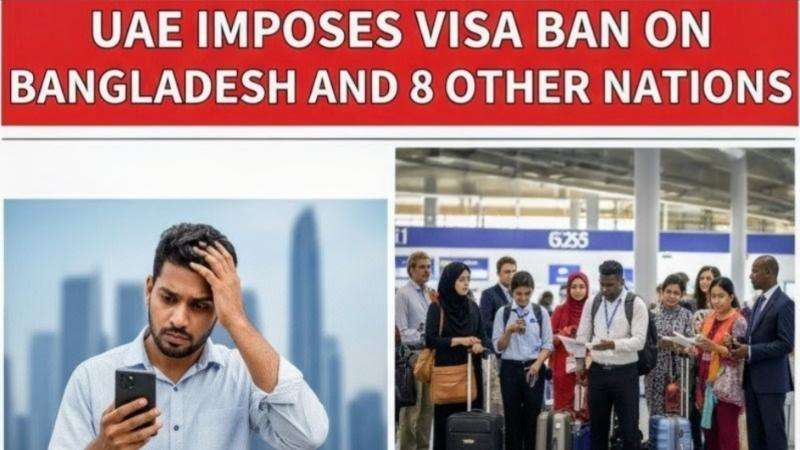The United Arab Emirates has placed a temporary visa ban on citizens of nine countries, a decision that has sent shockwaves through migrant communities, business sectors, and diplomatic circles. The new restrictions, which include a suspension of new tourist and work visas, affect Bangladesh, Afghanistan, Libya, Yemen, Somalia, Lebanon, Cameroon, Sudan, and Uganda. While the exact reasons have not been officially detailed by the UAE government, sources suggest the move is linked to security concerns, public health protocols, and issues related to illegal immigration and visa overstaying, Daily Dazzling Dawn understands.
The visa ban specifically targets new visa applications. This means that individuals from these countries who are already legally residing in the UAE with valid visas are not directly affected and can continue to work and live there. However, the ban creates a major hurdle for new workers and tourists hoping to enter the UAE, a hub for employment and travel.
Immediate Impact and Current Situation: The immediate impact is most profoundly felt by the vast expatriate communities from the affected nations. For countries like Bangladesh, which have a large population of migrant workers in the UAE, the ban is a significant blow. Many Bangladeshi families rely heavily on remittances sent home by relatives working in the Emirates. This new policy directly cuts off a vital pipeline of new employment opportunities, potentially leading to a decline in remittance flows and increased economic strain on these families.
Recruitment agencies and businesses that depend on labor from these countries are now facing a severe talent shortage. They are scrambling to find alternative solutions, and the cost of labor may increase as they look to other regions.
At the diplomatic level, governments of the affected nations are now engaged in urgent talks with UAE authorities. The goal is to understand the full scope of the restrictions, address the underlying issues, and negotiate for the ban to be lifted as quickly as possible. These discussions are critical to mitigating the long-term economic and social fallout.
Future Implications:The future remains uncertain, but several scenarios are possible. The ban could be a temporary measure, similar to previous visa restrictions imposed by the UAE. In the past, such bans were lifted following diplomatic negotiations and the implementation of new security or health protocols by the affected countries. The duration of this ban will depend on the speed and effectiveness of these diplomatic efforts.
For countries like Bangladesh, this event highlights the urgent need to diversify their labor export destinations and strengthen safeguards for their citizens working abroad. The incident may also prompt a re-evaluation of immigration policies and a crackdown on illegal activities that could have prompted the UAE's decision.
Experts suggest the ban serves as a stark reminder of the global nature of labor migration and the vulnerability of migrant economies to sudden policy changes. It underscores the importance of robust diplomatic ties, clear and transparent communication, and a shared commitment to addressing security and immigration challenges collaboratively.
As the situation unfolds, prospective travelers and workers are advised to stay updated through official channels from both their home country's foreign ministry and the UAE immigration authorities.
_8.jpg)
_5.jpg)
_8.jpg)





.svg)



_4.jpg)